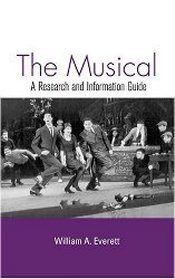Yet within academic circles, and musicology in particular, the musical has been one of the last genres to break free from marginalization, even within the once marginalized field of American music. Until recently, scholars who wrote on issues pertaining to musicals came from other areas of research, most often from the more "legitimate" world of Western art music. No one was a scholar specializing in musical theater. All this has changed, however, and the last five to eight years have seen the emergence of new dissertations on varied aspects of American musical theater from, among other places, Princeton (the mega-musical of the 1980s), the University of California, Berkeley (Stephen Sondheim), the University of Illinois (Jerome Kern), and The Ohio State University (Rodgers and Hammerstein), and established musicologists such as Raymond Knapp and Tim Carter, for instance, have committed themselves to exciting new work in this area. All this suggests that, as these new scholars turn to teaching and advising, they in turn will be overseeing new work that will continue to expand the horizons of research on the American musical.
This research will be aided by William A. Everett's much needed and highly valuable volume The Musical: A Research and Information Guide. This work provides a wonderful first stop for the researcher, regardless of level, and its user-friendly style suggests that the first stop will not be the last.
After a brief introduction in which Everett deals with the differences between musicals and operas, and between musicals for the stage and film musicals, the book is laid out in areas of increasing detail. Beginning with a listing of general histories of musical and theatrical genres, Everett moves to works specific to the musical. This second section is the longest, and its listing of dictionaries, encyclopedias, chronologies, and theoretical, analytical, sociological, and generic studies of the genre is inclusive. A relatively short section on the film musical follows, after which Everett lists books and, especially, articles about individual musicals. This is the section that will doubtless cause the most disappointment in users, if only because such a list must be, by its nature, somewhat subjective and cannot be all-inclusive. Everett acknowledges this in his introduction, however, and adds that, even if the user does not find a particular musical listed, the resources for finding material on that musical are included, thus expediting the search. Sections on creators - composers, wordsmiths, orchestrators, choreographers, and directors - performers, and aspects of performance follow.
The final five sections list periodicals that publish musical theater-related articles -- as of the finish date of 2003, Everett notes, there was still not "a scholarly journal devoted exclusively to the musical theater" (201) - sets of series of printed material, a discography, recorded anthologies, and other searchable resources, the latter containing a partial list of reliable websites. These final sections are good places to start if the reader wishes to pursue study of a particular work not listed in Everett's fourth section ("Works"). The listings are followed by a thorough index.
Everett is known as a scholar on the musical theater - he is co-editor, with Paul R. Laird, of The Cambridge Companion to the Musical and is working on a critical biography of Sigmund Romberg - as well as an experienced musical director. His affection for the genre is as notable as his dedication to helping new scholars in the field, and to this latter end his current work is exemplary. While the current rate of new scholarship means that the book is already missing several important entries, it is nonetheless timely and needed. Everett notes, at the end of his introduction, "My sincere hope is that this book will be a useful entryway for discovering the complex and stimulating world of the musical" (4). It is that, and more. It will undoubtedly remain the standard, essential bibliography for some time to come.
Jim Lovensheimer, Ph.D.
Blair School of Music, Vanderbilt University
